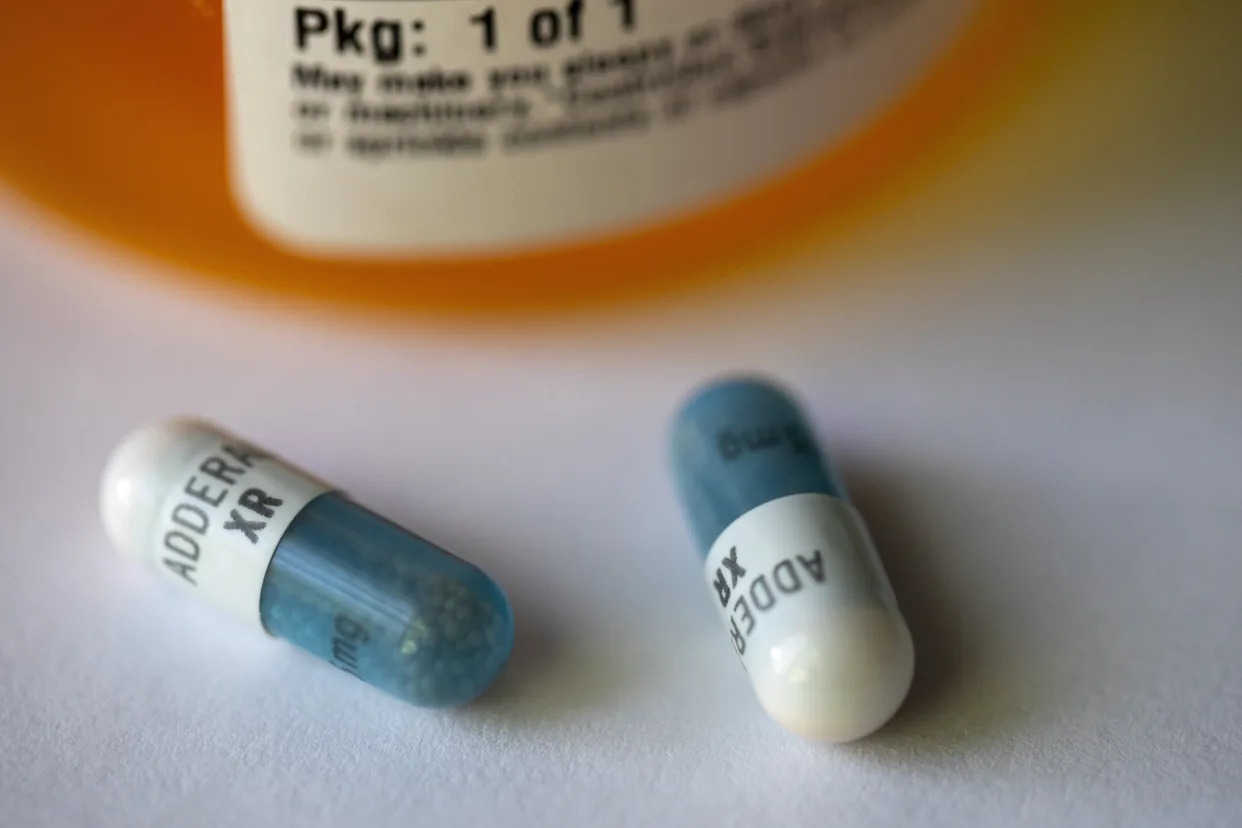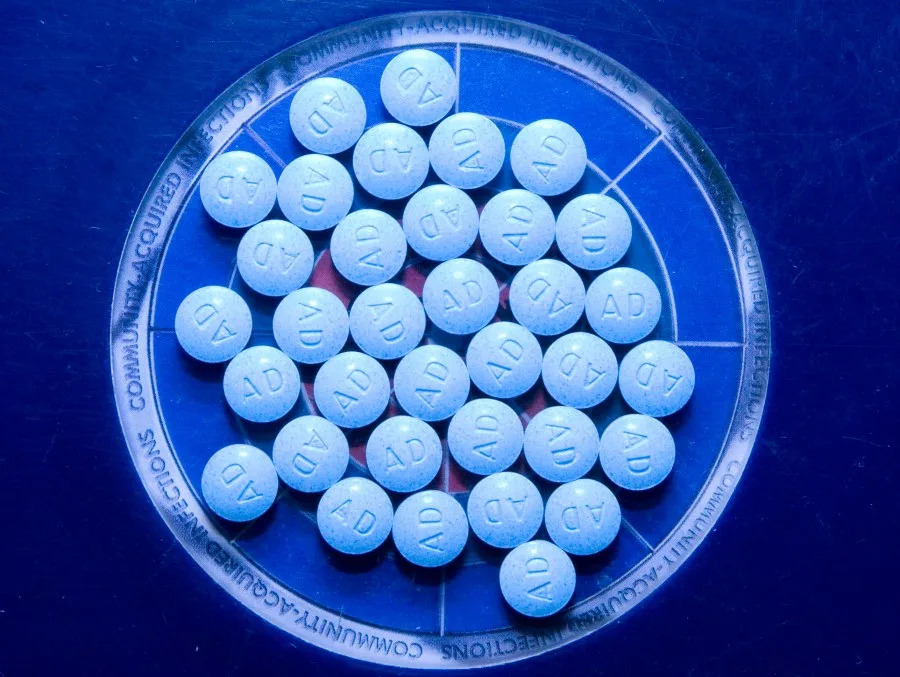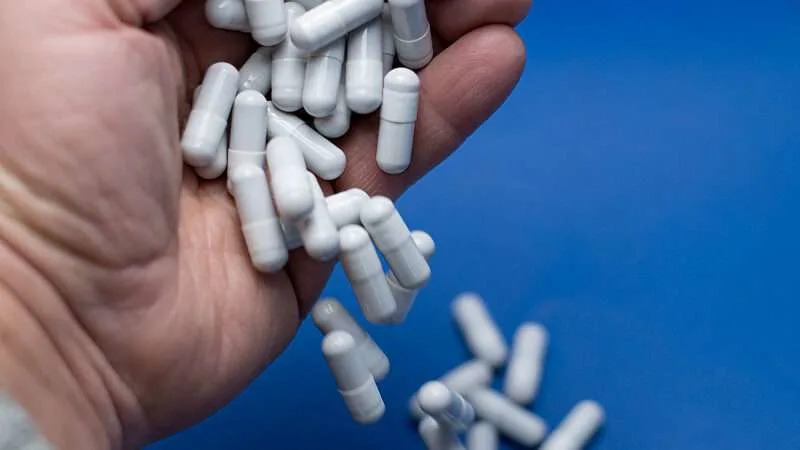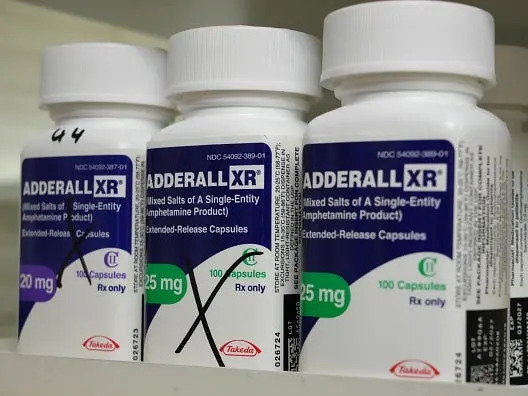CRIMINAL CAPITALI$M
JAIMIE DING
Thu, June 13, 2024

FILE - Adderall XR capsules are displayed on Friday, Feb. 24, 2023. The founder and CEO of a California telemedicine company, as well as its clinical president, have been arrested for allegedly distributing Adderall online and conspiring to commit health care fraud through reimbursements for the medication, officials said Thursday, June 13, 2024. (AP Photo/Jenny Kane, File)
LOS ANGELES (AP) — Top executives of a California-based online mental health company were arrested on allegations of improperly prescribing addictive stimulants like Adderall during the coronavirus pandemic and exacerbating the shortage of the drugs for those who medically need them, officials said Thursday.
Ruthia He, the founder and CEO of Done Global Inc., and clinical president David Brody were arrested Thursday in Los Angeles and San Rafael, California, respectively, for allegedly conspiring to provide easy access to Adderall and other stimulant drugs, which are largely used to treat attention-deficit hyperactivity disorder or ADHD, in exchange for a monthly subscription fee, the U.S. Justice Department announced.
Done Global allegedly helped prescribe more than 40 million pills of Adderall and other stimulants, and earned over $100 million in revenue, prosecutors said. He and Brody could not be reached for comment, and it was unclear if they have hired attorneys. Done Global did not immediately respond to an email asking for comment.
He and Brody are accused of instructing providers on Done Global to prescribe stimulant drugs even if the patient did not qualify, disincentivizing follow-up appointments by only paying based on the number of patients who received prescriptions, and requiring intake appointments to be under 30 minutes, the Justice Department said.
“As alleged, these defendants exploited the COVID-19 pandemic to develop and carry out a $100 million scheme to defraud taxpayers and provide easy access to Adderall and other stimulants for no legitimate medical purpose,” Attorney General Merrick B. Garland said in a statement.
On Thursday, the U.S. Centers for Disease Control and Prevention warned of “potential disrupted access to care” for people who rely on the platform or other telehealth platforms like it to receive medication that could affect 30,000 to 50,000 patients nationwide. There is an ongoing shortage of several prescription drugs used to treat ADHD, including Adderall. The CDC urged people to avoid using medication acquired from anyone other than a licensed clinician and pharmacy.
Last February, the Drug Enforcement Administration said it planned to reinstate longstanding federal requirements for an in-person doctor's visit to receive a prescription for addictive drugs such as OxyContin or Adderall amid growing concerns that some startup telehealth companies were improperly prescribing them.
“In many cases, Done Global prescribed ADHD medications when they were not medically necessary,” DEA official Anne Milgram said in a statement. “Any diversion of Adderall and other prescription stimulant pills to persons who have no medical need only exacerbates this shortage and hurts any American with a legitimate medical need for these drugs.”
Prosecutors allege He and Brody continued to distribute drugs in this manner after knowing of social media posts that Done Global patients had overdosed and died, the news release said. The two also allegedly lied to pharmacies and health insurance providers to ensure prescriptions were filled and paid for, with Medicare, Medicaid and insurance companies paying an excess of about $14 million, according to the news release.
The maximum penalty for He and Brody's charges is 20 years in prison.
California digital health company executives arrested
Amy Larson
Thu, June 13, 2024

SAN FRANCISCO (KRON) — Two California digital health company executives were arrested on Thursday for allegedly making $100 million in revenue by funneling Adderall and Ritalin to illegitimate patients.
David Brody, the clinical president of Done, was arrested in San Rafael. Brody will make his first court appearance in a San Francisco courtroom on Thursday afternoon. Ruthia He, the founder and CEO of Done Inc., was arrested in Los Angeles.
Federal investigators said the duo conspired to provide easy access to stimulants over the internet in exchange for monthly subscription fees from patients. A grand jury indictment alleges that the conspiracy’s purpose was for Done executives to unlawfully enrich themselves by prescribing over 40 million pills to patients, many whom were never medically evaluated.
Adderall and Ritalin are prescription stimulant drugs used to treat attention-deficit hyperactivity disorder (ADHD).
Done was founded in 2020 as a Northern California-based digital telemedicine health company that operated on a subscription-based model. Done advertised that it provided online diagnosis, treatment, and refills of medication for ADHD.
In 2022 the FDA issued a nationwide notice of shortages in prescription stimulants, including Adderall and Ritalin. Legitimate patients with ADHD struggled to refill their prescriptions as pharmacies were unable to maintain supplies.
DEA Administrator Anne Milgram said, “Instead of properly addressing medical needs, the defendants allegedly made millions of dollars by pushing addictive medications. Any diversion of Adderall and other prescription stimulant pills to persons who have no medical need only exacerbates this shortage and hurts any American with a legitimate medical need for these drugs.”
Parents worried about Adderall shortages as kids start school
Amphetamine-dextroamphetamine is sold generically and under a variety of brand names, including Adderall. Methylphenidate is sometimes sold under the brand name Ritalin. Pharmacists are required to exercise sound professional judgment, and to adhere to professional standards, when making a determination about the legitimacy of a controlled substance prescription.
Brody was a psychiatrist who maintained a DEA registration number and was authorized to prescribe controlled substances in California. Ruthia He owned, controlled, and operated Done.
Done’s prescribers wrote prescriptions for Done members “without an examination, sometimes based solely on a short video or audio communication and limited patient intake documents, or without any video or audio communication at all,” an indictment states.
According to the indictment, the scheme racked up thousands of members by spending millions of dollars on deceptive social media advertisements, as well as by intentionally targeting drug-seeking patients. The indictment was filed on Wednesday in U.S. District Court Northern District of California.
Some Done members overdosed and died, Guy Ficco of Internal Revenue Service Criminal Investigation said.
“Instead of prioritizing the health of their customers, He and Brody’s telemedicine company allegedly prioritized profits — more than $100 million worth — by fraudulently prescribing medications,” Ficco said. “This led customers to addiction, abuse, and overdoses, which the company tried to conceal by making false representations to the media in order to deter oversight by government agencies.”
As more health care needs are met through telemedicine, fraud schemes that recklessly exploit digital technologies will be prosecuted, federal officials said.
He_Brody_indictmentDownload
He and Brody are charged with conspiracy to distribute controlled substances, distribution of controlled substances, conspiracy to commit health care fraud, and conspiracy to obstruct justice. If convicted, He and Brody each face a maximum penalty of 20 years in prison.
Copyright 2024 Nexstar Media, Inc. All rights reserved. This material may not be published, broadcast, rewritten, or redistributed.
Joe Lancaster
Fri, June 14, 2024

Milcho Milev | Dreamstime.com
The government has charged two medical executives for allegedly overprescribing prescription stimulants. Unfortunately, there's no sign that any government officials will ever face repercussions for making those same medications harder for people to get in the first place.
On Thursday, the Department of Justice announced that it had arrested two executives at the telehealth company Done Global on several charges, including conspiracy to commit health care fraud and obstruction of justice.
Ruthia He, Done's founder and CEO, and David Brody, the company's clinical president, are alleged to have "exploited the COVID-19 pandemic to develop and carry out a $100 million scheme to defraud taxpayers and provide easy access to Adderall and other stimulants for no legitimate medical purpose," according to U.S. Attorney General Merrick Garland. Adderall is the name-brand prescription stimulant most often used to treat attention-deficit/hyperactivity disorder (ADHD), as well as other conditions, such as narcolepsy.
In March 2020, at the outset of the COVID-19 pandemic, the Drug Enforcement Administration (DEA) announced that doctors and nurse practitioners could now issue prescriptions for controlled substances via telehealth, relaxing a provision in a 2008 law requiring at least one in-person evaluation first.
He, a former Facebook product designer, founded Done in December 2019, just weeks before COVID-19 reached America's shores. Done raised money from such investors as venture capitalist David Sacks and former NFL quarterback Joe Montana.
In its indictment, the government alleges that company officials "exploited emergency flexibilities during the public health emergency to provide easy access to Adderall and other stimulants that were not for a legitimate medical purpose in the usual course of professional practice." The company found many of its patients through ads on social media.
Prosecutors claim that under the company's policies, patient assessments were limited to 30 minutes and practitioners were expected to issue stimulant prescriptions "even if the Done member did not qualify." (In fact, Done touts the 30-minute initial appointment on its website.) The filing states that Done did not require followup appointments and even refused to reimburse providers for any appointments after an initial consultation—an action undertaken, as He allegedly wrote, to "dis-encourage follow-up."
The indictment charges that Done also created fake documents, including patient records and prior authorizations, to submit "false and fraudulent claims" to pharmacies, as well as to Medicare, Medicaid, and private insurers, which "paid in excess of approximately $14 million."
Much of this should be unsurprising: In March 2022, the New York Post covered the proliferation of telehealth firms' social media ads hawking stimulants, which doctors found concerning. That same month, The Wall Street Journal reported that telehealth startups like Done "applied pressure on clinicians to prescribe stimulants, and some [employees] said the companies' initial 30-minute video evaluations often weren't sufficient to diagnose ADHD." In May 2022, Walmart and CVS both announced that they would no longer fill controlled-substance prescriptions from Done. By September 2022, news outlets were reporting that the DEA was investigating Done for potential violations of the Controlled Substances Act.
To substantiate charges of obstruction of justice, the indictment alleges that as public opinion shifted against the company, executives like He and Brody set about "corruptly altering, destroying, and concealing records and documents," including after they received a grand jury subpoena.
The government alleges that Done prescribed 40 million pills and generated $100 million in revenue since the start of the pandemic. Ironically, much of this alleged overprescribing took place as the U.S. experienced a severe Adderall shortage—for which government officials still refuse to accept any responsibility.
As Reason has documented very extensively, the Food and Drug Administration first declared an Adderall shortage in October 2022. Parents stuck at home with their children struggling to pay attention to school over Zoom, along with relaxed rules on telehealth prescriptions, caused ADHD diagnoses to skyrocket.
But the federal government sets annual production caps on controlled substances—including the amphetamines that make up the active ingredients in prescription stimulants like Adderall. And since the start of the Adderall shortage, the government has declined to raise the quotas, keeping the cap in place even as the demand for the drug has gone through the roof.
The DEA noted in its 2023 report that while it was "aware of patient reports that pharmacies are unable to fill prescriptions for their prescribed Adderall or one of its generic versions," it nonetheless "has not implemented an increase to the [quota] for amphetamine at this time." In its report for 2024, the agency "determined" that the existing quotas "are sufficient to supply legitimate medical needs, reserve stocks, and export requirements for 2024."
If the prosecutors' claims are true, Done Global very likely engaged in fraudulent and criminally negligent behavior in order to maximize profits at the expense of its patients—at least one of whom died, allegedly as a result of the company's lax policies.
But for ADHD patients who genuinely depend on medicines like Adderall, the government's actions produced a shortage keeping countless people from accessing a medication that allows them to function better. While Ruthia He and David Brody will be faced with the consequences of their actions, it's unlikely that any government official will ever face the same.
The post Feds Arrest Telehealth Execs for Overprescribing Adderall appeared first on Reason.com.
CEO arrested and accused of running an Adderall drug ring
Grace Eliza Goodwin
Updated Fri, June 14, 2024

CEO arrested and accused of running an Adderall drug ring
Two telehealth execs have been accused of running an illegal drug scheme.
The DOJ says the executives raked in $100 million by doling out millions of phony prescriptions.
The department says they didn't back down even when they learned some patients had overdosed.
Two executives of a California telehealth company have been arrested and accused of running an illegal Adderall drug scheme to the tune of $100 million.
In a press release on Thursday, the Justice Department announced the arrests of Ruthia He, the founder and CEO of Done Global Inc., and David Brody, the digital-health company's clinical president, in California.
The department alleges that the two executives committed healthcare fraud by remotely distributing Adderall and other stimulants to patients for no medical purpose and then submitting false claims for reimbursement of the drugs.
Prosecutors accuse the pair of not backing down even after they learned Done members had overdosed and died.
"The individuals charged today allegedly disregarded the first rule of medical care — do no harm — in order to maximize profits, and there is no place for such fraud in our healthcare system," Alejandro N. Mayorkas, the secretary of homeland security, said in the Justice Department's press release.
Done Health and attorneys for He and Brody didn't immediately respond to requests for comment.
The Justice Department accuses the defendants of luring drug seekers to the subscription-based healthcare service through millions of dollars of deceptive social-media advertisements.
Prosecutors say they then encouraged doctors in their network to prescribe Adderall, even when a patient didn't qualify, helping them make $100 million in revenue from prescriptions of more than 40 million pills.
He and Brody, prosecutors say, ordered that doctors keep initial patient consultations to under 30 minutes, then set up an auto-refill option to keep patients' prescriptions flowing without the need for follow-up appointments.
The defendants, prosecutors allege, also discouraged doctors from continuously caring for patients by refusing to pay them for any medical visits beyond the initial consultation. Instead, He and Brody paid them for the number of prescriptions they doled out, the department says.
He and Brody, the department alleges, kept the plan going after they were told that people had been posting social-media explainers on how to use Done to get easy access to Adderall and other addictive drugs.
In addition to the drug-conspiracy charges, He and Brody were charged with conspiracy to obstruct justice. Prosecutors allege the pair learned about a grand-jury subpoena and "deleted documents and communications," spoke through encrypted messages, and didn't provide the subpoenaed documents to the grand jury.
This is the first time that anyone has been charged with operating an illegal drug-distribution scheme through a telemedicine company, according to the department.
Both He and Brody face up to 20 years in prison.
Read the original article on Business Insider

No comments:
Post a Comment